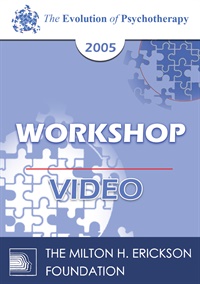- Average Rating:
- Not yet rated
- Topic Areas:
- Workshops | Dreamwork | Psychotherapy
- Categories:
- Evolution of Psychotherapy | Evolution of Psychotherapy 2005
- Faculty:
- James Hillman, PhD
- Course Levels:
- Master Degree or Higher in Health-Related Field
- Duration:
- 1:52:44
- Format:
- Audio and Video
- Original Program Date:
- Dec 11, 2005
- Short Description:
- Dreaming is a natural human function from early childhood to late maturity. Beginning with Freud and Jung the practice of clinical psychology centered originally on dream analysis. The importance of dreaming has fallen into neglect in most contemporary therapies. This workshop offers practical cues for working with dreams to benefit participants own techniques, selfknowledge and their client's psychic equilibrium.
- Price:
-
Sale is $29.00
price reduced from Base Price - $59.00
Tags: Dreams James Hillman Psychotherapy
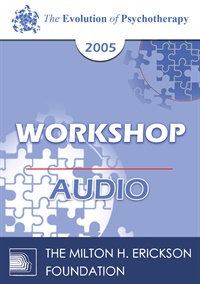
- Average Rating:
- Not yet rated
- Topic Areas:
- Workshops | Psychotherapy | Family Therapy | Managed Care | Positive Psychology
- Categories:
- Evolution of Psychotherapy | Evolution of Psychotherapy 2005 | Pioneers in Couples and Family Therapy
- Faculty:
- Cloe Madanes, HDL, LIC | Anthony Robbins
- Duration:
- 1 Hour 58 Minutes
- Format:
- Audio Only
- Original Program Date:
- Dec 11, 2005
- Short Description:
- Robbins and Madanes address five major challenges facing modern therapy: overreliance on medication, managed care, declining therapist income, rigid protocols, and inadequate training. They introduce human needs psychology as a practical, transformative framework built on six core needs...certainty, variety, significance, connection, growth, and contribution. Emphasizing lasting change through meaning and relationships, they advocate for personal growth over quick fixes, with medication as a last resort.
- Price:
- $15.00 - Base Price
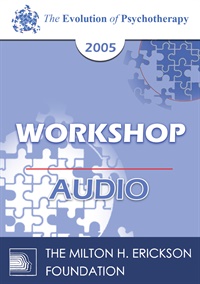
- Average Rating:
- Not yet rated
- Topic Areas:
- Workshops | Multicultural | Storytelling
- Categories:
- Evolution of Psychotherapy | Evolution of Psychotherapy 2005
- Faculty:
- Monica McGoldrick, PhD
- Duration:
- 1 Hour 34 Minutes
- Format:
- Audio Only
- Original Program Date:
- Dec 11, 2005
- Short Description:
- This workshop will explore the impact of gender, culture, class and race on our clinical practice, and describe techniques for working with clients who are culturally different from ourselves. The workshop will consider the relevance of cultural differences for families even many generations beyond immigration. The issue of stereotyping and emphasizing that everyone is ethnic will be dealt with, rather than approaching culture by focusing on the exotic, esoteric or different characteristics of minorities and new immigrant groups. Professor McGoldrick will demonstrate the use of genograms and family play to address cultural, racial and spiritual legacies and patterns in clinical assessment and intervention -- drawing them, interpreting them and applying them therapeutically.
- Price:
- $15.00 - Base Price
Tags: Multi-Cultural Storytelling
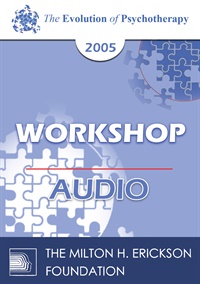
- Average Rating:
- Not yet rated
- Topic Areas:
- Workshops
- Categories:
- Evolution of Psychotherapy | Evolution of Psychotherapy 2005
- Faculty:
- Yvonne Dolan, MA
- Duration:
- 47 Minutes
- Format:
- Audio Only
- Original Program Date:
- Dec 11, 2005
- Short Description:
- EP05 Workshop 37 - A Tribute to Steve de Shazer: Originator of the Solution-Focused Brief Therapy Approach - Yvonne Dolan M.A. This workshop will celebrate the theoretical, technical and clinical contributions of the late Steve de Shazer through video tape, lecture and discussion. It will include a brief preview of material from de Shazer's most recent book, More Than Miracle: The State of the Art of Solution-Focused Brief Therapy which updates the SFBT.
- Price:
- $15.00 - Base Price
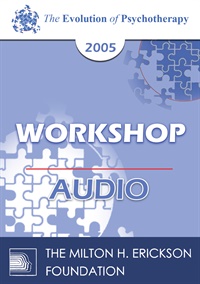
- Average Rating:
- Not yet rated
- Topic Areas:
- Workshops
- Categories:
- Evolution of Psychotherapy | Evolution of Psychotherapy 2005
- Faculty:
- Jeffrey Zeig, PhD
- Duration:
- 1 Hour 48 Minutes
- Format:
- Audio Only
- Original Program Date:
- Dec 11, 2005
- Short Description:
- EP05 Workshop 36 - Growth Games for BEING the Best Therapist - Jeffrey Zeig, Ph.D. This "playshop" will consist of experiential clinician development exercises. While it is widely agreed that the person of the therapist is central to patient change, there are limited methods for developing the person of the therapist. Dr. Zeig will present a systemic model that can be easily transferred to make therapy and supervision more powerfully experiential.
- Price:
- $15.00 - Base Price
- Average Rating:
- Not yet rated
- Topic Areas:
- Workshops | Personality Disorders | Psychotherapy
- Categories:
- Evolution of Psychotherapy | Evolution of Psychotherapy 2005
- Faculty:
- Otto Kernberg, MD
- Course Levels:
- Master Degree or Higher in Health-Related Field
- Duration:
- 2:03:54
- Format:
- Audio and Video
- Original Program Date:
- Dec 11, 2005
- Short Description:
- EP05 Workshop 35 - Etiology, Psychotherapy. Diagnosis and Treatment Indicators for Severe Personality Disorders - Otto Kernberg, M.D. Present day knowledge and leading hypotheses regarding severe personality disorders will be reviewed, and their relationship to clinical characteristics of these patients clarified. A critical review of present classification will be followed by exploration of specific technical approaches to diagnostic interviewing and decision-making regarding specific therapeutic approaches to each patient.
- Price:
-
Sale is $29.00
price reduced from Base Price - $59.00
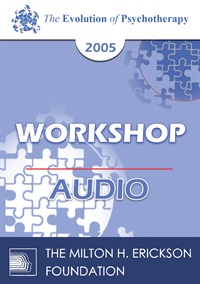
- Average Rating:
- Not yet rated
- Topic Areas:
- Workshops | Leadership | Therapist Development
- Categories:
- Evolution of Psychotherapy | Evolution of Psychotherapy 2005
- Faculty:
- William Glasser, MD
- Duration:
- 1 Hour 59 Minutes
- Format:
- Audio Only
- Original Program Date:
- Dec 11, 2005
- Short Description:
- EP05 Workshop 34 - A New Leadership Role for Mental Health Professionals - William Glasser, M.D. The leadership role in mental health has been assumed by psychiatrists who diagnose mental illnesses that do not exist and treat them with potentially harmful brain drugs. Dr. Glasser will explain that mental health separate from mental illness does exist if we could change from the mental illness model to a new public health model based on mental health. This will allow psychotherapists to assume a leadership role they don't have now.
- Price:
- $15.00 - Base Price
- Average Rating:
- Not yet rated
- Topic Areas:
- Workshops
- Categories:
- Evolution of Psychotherapy | Evolution of Psychotherapy 2005
- Faculty:
- Robert Dilts, BA
- Course Levels:
- Master Degree or Higher in Health-Related Field
- Duration:
- 1:58:09
- Format:
- Audio and Video
- Original Program Date:
- Dec 11, 2005
- Short Description:
- EP05 Workshop 33 - Imagineering: Helping Clients Find the Path to Change - Robert Dilts lmagineering is a term coined by Walt Disney to describe the process he used to form dreams and then turn them into realities. The lmagineering process essentially involves creating and evaluating the steps necessary to reach a desired state. It can be applied to help clients find creative solutions to many problems.
- Price:
-
Sale is $29.00
price reduced from Base Price - $59.00
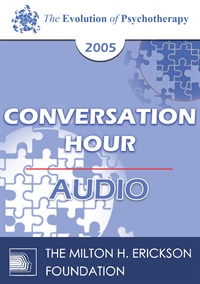
- Average Rating:
- Not yet rated
- Topic Areas:
- Conversation Hours | Psychotherapy | Ethical Practice | Social Psychology
- Categories:
- Evolution of Psychotherapy | Evolution of Psychotherapy 2005
- Faculty:
- Albert Bandura
- Duration:
- 2 Hours 2 Minutes
- Format:
- Audio Only
- Original Program Date:
- Dec 11, 2005
- Short Description:
- This session examines how ordinary people come to participate in cruelty, violence, and systemic harm without seeing themselves as immoral. Drawing on social psychology, it unpacks processes like moral disengagement, dehumanization, diffusion of responsibility, and euphemistic language, showing how they operate in war, corporations, media, punishment systems, and everyday institutions. For therapists and students, it offers a powerful framework for understanding aggression, conscience, and ethical breakdown, with clear implications for clinical work, social responsibility, and prevention.
- Price:
- $15.00 - Base Price
- Average Rating:
- Not yet rated
- Topic Areas:
- State of the Art Address | Psychotherapy | Therapist Development
- Categories:
- Evolution of Psychotherapy | Evolution of Psychotherapy 2005
- Faculty:
- Robert Dilts, BA
- Course Levels:
- Master Degree or Higher in Health-Related Field
- Duration:
- 1:04:27
- Format:
- Audio and Video
- Original Program Date:
- Dec 11, 2005
- Short Description:
- The notion of "logical levels" refers to the fact that some processes and phenomena are created by the relationships between other processes and phenomena. The function of each level is to synthesize, organize and direct the interactions on the level below it. Changing something on an upper level would necessarily radiate downward, precipitating change on the lower levels. This presentation will cover the six basic levels of therapeutic change: environment, behavior, capabilities, beliefs and values, identity and spiritual.
- Price:
-
Sale is $29.00
price reduced from Base Price - $59.00
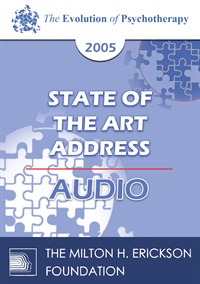
- Average Rating:
- Not yet rated
- Topic Areas:
- State of the Art Address | Psychotherapy | Therapist Development
- Categories:
- Evolution of Psychotherapy | Evolution of Psychotherapy 2005
- Faculty:
- Harville Hendrix, PhD
- Duration:
- 51 Minutes
- Format:
- Audio Only
- Original Program Date:
- Dec 11, 2005
- Short Description:
- For decades, psychotherapy based upon the paradigm of the individual, has focused on the intrapsychic world of the client. The focus is now shifting to the interpersonal, as a result of the appearance of the relational paradigm from the collective unconscious. This shifting of paradigms will challenge and transform the process of diagnosis and therapeutic interventions of all forms of therapy. This address will outline this historical shift and suggest its implications for therapy theory and practice.
- Price:
- $15.00 - Base Price
- Average Rating:
- Not yet rated
- Topic Areas:
- State of the Art Address | Neurobiology | Psychotherapy
- Categories:
- Evolution of Psychotherapy | Evolution of Psychotherapy 2005
- Faculty:
- Daniel Siegel, MD
- Course Levels:
- Master Degree or Higher in Health-Related Field
- Duration:
- 1:02:46
- Format:
- Audio and Video
- Original Program Date:
- Dec 11, 2005
- Short Description:
- Interpersonal neurobiology is a way to define mental health and the kinds of social experiences the brain requires to achieve a coherent mind. This interdisciplinary synthesis of science reveals an exciting convergence among research findings that helps us in mental health to explore the interplay among relationships, the mind and the brain. Experience shapes the connections in the brain in ways that we can now understand and harness within psychotherapy to help stimulate the neuronal activation and growth necessary to achieve resilience and emotional well-being.
- Price:
-
Sale is $29.00
price reduced from Base Price - $59.00
Tags: Neurobiology Psychotherapy
- Average Rating:
- Not yet rated
- Topic Areas:
- Keynotes | Cognitive Behavior Therapy (CBT) | Psychotherapy | Pain and Healing | Panic
- Categories:
- Evolution of Psychotherapy | Evolution of Psychotherapy 2005
- Faculty:
- Aaron Beck, MD
- Course Levels:
- Master Degree or Higher in Health-Related Field
- Duration:
- 1:04:42
- Format:
- Audio and Video
- Original Program Date:
- Dec 11, 2005
- Short Description:
- Dr. Beck will provide a perspective on the evolution and the place of cognitive therapy today. He will compare standard cognitive therapy to newer developments in theory and therapy such as mindfulness, attention focus, and positive psychology. Dr. Beck also will discuss the role of cognitive approaches to conflict and suffering.
- Price:
-
Sale is $29.00
price reduced from Base Price - $59.00
- Average Rating:
- Not yet rated
- Topic Areas:
- State of the Art Address | Rational Emotive Behavior Therapy (REBT) | Brief Therapy | Psychotherapy | Therapist Development
- Categories:
- Evolution of Psychotherapy | Evolution of Psychotherapy 2005
- Faculty:
- Albert Ellis, PhD
- Course Levels:
- Master Degree or Higher in Health-Related Field
- Duration:
- 57:01
- Format:
- Audio and Video
- Original Program Date:
- Dec 11, 2005
- Short Description:
- Dr. Ellis will describe the up-to-date principles and practice of Rational Emotive Behavior Therapy (REBT) in the twenty-first century, how some people are trying to water it down, and what its future will probably be.
- Price:
-
Sale is $29.00
price reduced from Base Price - $59.00
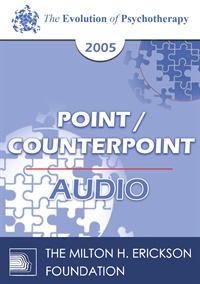
- Average Rating:
- Not yet rated
- Topic Areas:
- Point/Counterpoint Sessions | Law & Ethics | Psychotherapy
- Categories:
- Evolution of Psychotherapy | Evolution of Psychotherapy 2005
- Faculty:
- Thomas Szasz, MD | James Hillman, PhD
- Duration:
- 1 Hour 19 Minutes
- Format:
- Audio Only
- Original Program Date:
- Dec 10, 2005
- Short Description:
- Analysis of the problematic nature of the concepts of mental illness and psychological (verbal) therapy. How psychotherapists influence persons. Examination of the economic, ethical and legal aspects of psychotherapy.
- Price:
- $15.00 - Base Price
Tags: Ethics Law Psychotherapy Thomas Szasz
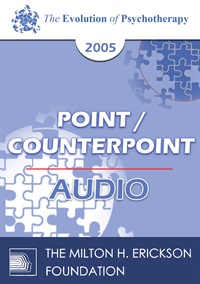
- Average Rating:
- Not yet rated
- Topic Areas:
- Point/Counterpoint Sessions | Hypnosis | Phenomenology | Psychotherapy
- Categories:
- Evolution of Psychotherapy | Evolution of Psychotherapy 2005
- Faculty:
- Jeffrey Zeig, PhD | Marsha Linehan, PhD
- Duration:
- 1 Hour 19 Minutes
- Format:
- Audio Only
- Original Program Date:
- Dec 10, 2005
- Short Description:
- Hypnosis is commonly thought of as a tool to enhance the therapy. It also can be used as a "lens." The phenomenology of hypnosis can help us to understand an essential aspect of the trance state, the symptom state, the solution state and the therapist's state, thereby providing new options for treatment.
- Price:
- $15.00 - Base Price

- Average Rating:
- Not yet rated
- Topic Areas:
- Point/Counterpoint Sessions | Neurobiology | Object Relations Theory | Psychotherapy | Attachment | History of Psychotherapy
- Categories:
- Evolution of Psychotherapy | Evolution of Psychotherapy 2005
- Faculty:
- James F. Masterson, MD | Erving Polster, PhD
- Duration:
- 1 Hour 18 Minutes
- Format:
- Audio Only
- Original Program Date:
- Dec 10, 2005
- Short Description:
- This talk first briefly reviews the history of the Developmental, Self and Object Relations theoretical approach to the personality disorders as a preface to exploring the latest additions to the theory, i.e., Attachment Theory and Neurobiological Development of the Self in the Right Brain. Attachment Theory: The work of Ainsworth and others is described leading to the attachment categories in the infant and the adult. Many follow-up studies are presented validating the persistence of the categories over time. Neurobiologic Development of the Self in the Right Brain: The work of Alan Schore, Ph.D. is used to describe the development of the self in the right prefrontal cortex of the brain. Integration: The integration of the two theories with the object relations approach are described and illustrated through therapeutic alliance
- Price:
- $15.00 - Base Price
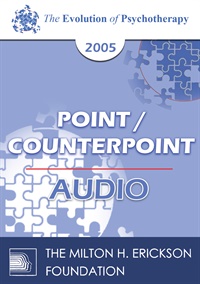
- Average Rating:
- Not yet rated
- Topic Areas:
- Point/Counterpoint Sessions | Psychotherapy | Therapist Development
- Categories:
- Evolution of Psychotherapy | Evolution of Psychotherapy 2005
- Faculty:
- James Hillman, PhD | Donald Meichenbaum, PhD
- Duration:
- 1 Hour 19 Minutes
- Format:
- Audio Only
- Original Program Date:
- Dec 10, 2005
- Short Description:
- The client comes for help because he/she is "deeply" troubled. These "deeps" lurking inside problems need to be spoken about by the client and spoken to by the therapist/counselor. Otherwise practice fails its promise and becomes a bag of tricks for fixing problems.
- Price:
- $15.00 - Base Price
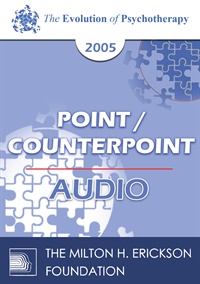
- Average Rating:
- Not yet rated
- Topic Areas:
- Point/Counterpoint Sessions | Anxiety | Psychotherapy
- Categories:
- Evolution of Psychotherapy | Evolution of Psychotherapy 2005
- Faculty:
- Marsha Linehan, PhD | Arnold Lazarus, Ph.D.
- Duration:
- 1 Hour 19 Minutes
- Format:
- Audio Only
- Original Program Date:
- Dec 10, 2005
- Short Description:
- Effective exposure based treatments work via cue exposure, response prevention, and reinforced "opposite action" (all the way). The principles of exposure treatments for anxiety disorders can be generalized to treat disorders of other emotions such as anger, sadness, jealousy, envy, shame and guilt. Opposite action can be taught as a skill.
- Price:
- $15.00 - Base Price
Tags: Anxiety Psychotherapy
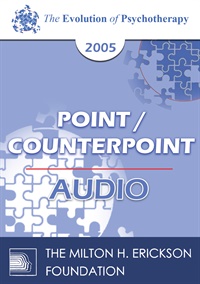
- Average Rating:
- Not yet rated
- Topic Areas:
- Point/Counterpoint Sessions | Aging and Mortality | Psychotherapy | Family Therapy
- Categories:
- Evolution of Psychotherapy | Evolution of Psychotherapy 2005
- Faculty:
- Mary Goulding, MSW | Salvador Minuchin, MD
- Duration:
- 1 Hour 19 Minutes
- Format:
- Audio Only
- Original Program Date:
- Dec 10, 2005
- Short Description:
- The emotional problems, physical impairments, financial difficulties and, especially, how does someone nearing death cope with the belief that the world has become so much less caring and altruistic than it was in much of the previous century.
- Price:
- $15.00 - Base Price
- Average Rating:
- Not yet rated
- Topic Areas:
- State of the Art Address | Psychotherapy | History of Psychotherapy
- Categories:
- Evolution of Psychotherapy | Evolution of Psychotherapy 2005
- Faculty:
- Nicholas Cummings, PhD
- Course Levels:
- Master Degree or Higher in Health-Related Field
- Duration:
- 1:01:58
- Format:
- Audio and Video
- Original Program Date:
- Dec 10, 2005
- Short Description:
- Psychotherapy practice, as we know it today, was born in World War II. Dr. Cummings was there, working with paratroopers in combat, and he has been a psychotherapist and mental health activist in the 60 years since. He wrote the first prepaid psychotherapy insurance benefit in the late 1950s and demonstrated that psychotherapy should be part of all health insurance. He has been in the forefront as an active participant in psychotherapy's achievements, setbacks and hopes for the future. This address will highlight the 60 years of psychotherapy's evolution through the life of one of its leaders.
- Price:
-
Sale is $29.00
price reduced from Base Price - $59.00
- Average Rating:
- Not yet rated
- Topic Areas:
- State of the Art Address | Psychotherapy | Positive Psychology | Depression | Happiness | Psychology
- Categories:
- Evolution of Psychotherapy | Evolution of Psychotherapy 2005
- Faculty:
- Martin Seligman, PhD
- Course Levels:
- Master Degree or Higher in Health-Related Field
- Duration:
- 56:23
- Format:
- Audio and Video
- Original Program Date:
- Dec 10, 2005
- Short Description:
- Happiness consists of The Pleasant Life (Positive Emotions), the Engaged Life, and the Meaningful Life. Interventions which build these three lives fight depression. Dr. Seligman will present empirical documentation of this for individual, group, and web-based interventions.
- Price:
-
Sale is $29.00
price reduced from Base Price - $59.00
- Average Rating:
- Not yet rated
- Topic Areas:
- Invited Addresses | Psychotherapy | Art and Creativity
- Categories:
- Evolution of Psychotherapy | Evolution of Psychotherapy 2005
- Faculty:
- Irvin Yalom, PhD
- Course Levels:
- Master Degree or Higher in Health-Related Field
- Duration:
- 1:52:51
- Format:
- Audio and Video
- Original Program Date:
- Dec 10, 2005
- Short Description:
- This presentation will be a discussion of existential psychotherapy and of group psychotherapy drawing especially from Yalom's new teaching novel, The Schopenhauer Cure. Dr. Yalom will discuss: the therapist/client relationship from an existential therapy perspective; the practice of existentially oriented psychotherapy using recent clinical cases; the impact of death awareness on the conduct of life; the technique of the group therapist; the selection and preparation of group patients; the relevance of philosophy for therapy; and the case for and against clinical philosophy. Dr. Yalom will sign books after his presentation in the Arena Lobby.
- Price:
-
Sale is $29.00
price reduced from Base Price - $59.00
- Average Rating:
- Not yet rated
- Topic Areas:
- Dialogues | Psychotherapy
- Categories:
- Evolution of Psychotherapy | Evolution of Psychotherapy 2005
- Faculty:
- Albert Ellis, PhD | William Glasser, MD
- Course Levels:
- Master Degree or Higher in Health-Related Field
- Duration:
- 57:54
- Format:
- Audio and Video
- Original Program Date:
- Dec 10, 2005
- Short Description:
- Dialogue 11 from the Evolution of Psychotherapy 2005 - Mental Health Featuring Albert Ellis, PhD, and William Glasser, MD Moderated by Bernhard Trenkle, Dipl. Psych
- Price:
-
Sale is $29.00
price reduced from Base Price - $59.00
- Average Rating:
- Not yet rated
- Topic Areas:
- Dialogues | Neurobiology | Neuroscience | Psychotherapy
- Categories:
- Evolution of Psychotherapy | Evolution of Psychotherapy 2005
- Faculty:
- Ernest Rossi, PhD | Daniel Siegel, MD
- Course Levels:
- Master Degree or Higher in Health-Related Field
- Duration:
- 59:36
- Format:
- Audio and Video
- Original Program Date:
- Dec 10, 2005
- Short Description:
- Dialogue 10 from the Evolution of Psychotherapy 2005 - The Psychobiology of Change Featuring Ernest Rossi, PHD, and Daniel Siegel, MD
- Price:
-
Sale is $29.00
price reduced from Base Price - $59.00


